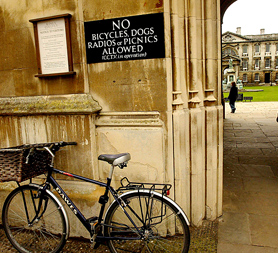Tuition fees: row over places for wealthy students
The Government denies plans to let wealthy parents pay higher fees to secure their children a place at university, insisting that access must be based on “ability to learn, not ability to pay”.

Universities Minister David Willetts told MPs he was “happy to give his assurance” that rich students would never be able to buy their way into university under this Government.
A row broke out following an article in today’s Guardian, that indicated the government was looking at proposals which would allow universities to charge wealthy students the same full-price fees as overseas undergraduates. The plans outlined would allow students who had achieved the A-level grades but were turned down, to potentially pay their way back into a university place.
Under current Government plans, annual student numbers are capped to keep costs down. But these wealthier students would be outside that cap because they would not be eligible for Government loans.
English universities will be allowed to charge UK students a maximum fee of £9,000 from 2012, which graduates do not have to start paying until they are earning more than £21,000.
However, Universities Minister David Willetts had suggested universities could increase the numbers of British students outside the cap by charging some the full annual fees of up to £28,000 a year for the most expensive courses, payable up front, without the support of the taxpayer.
The University and College Union (UCU) accused Mr Willetts of proposing a way of “buying places”, which only highlights the “complete disarray” the Government’s fees policy is in.
Increasing fees for wealthy students to ensure them access to our most prestigious universities… sends an extraordinary message to students from less wealthy backgrounds. Sally Hunt, UCU
UCU general secretary Sally Hunt said: “I am amazed that such plans are under consideration.
“Far from increasing social mobility, it is hard to see how this is anything other than the Government entrenching privilege for the wealthy in response to its failing university fees policy. We risk turning the clock back to a time when breeding rather than brains were required to get on in life.”
Yet Mr Willetts later issued a statement insisting that the Government would not approve any scheme enabling wealthy students to “buy” places.
He insisted in the Commons that the government was looking at how charities and employers might fund more extra places at universities.
“We will only consider allowing off-quota places where it contributes to the Coalition commitment to improve social mobility and increase fair access,” he said.
“There is no question of wealthy students being able to buy a place at university. Access to university must be based on ability to learn not ability to pay.”
He said the Government has discussed the idea of charitable donors and employer-funded places, all of which will be looked at in a Higher Education White Paper later this year.
Mr Willets had said in a radio interview earlier today: “I start from the view that by and large more people going to university is a good thing for social mobility. I think going to university is a fantastic opportunity and it’s particularly good for young people who come from a tough background and may be let down by the school system.
“If this goes forward – and these are just ideas put to us – it would have to pass the test of improving social mobility, not reversing it,” he told the BBC’s Today programme.
This creates a two tier system that allows the richest, less able, applicants a second bite at the university cherry. Aaron Porter, NUS President
Ms Hunt said increasing fees for wealthy students “sends an extraordinary message to students from less wealthy backgrounds”.
She said the proposals were particularly embarrassing for the Liberal Democrats since they would have gone further against the grain of their original pledge not to raise tuition fees.
John Denham MP, Labour’s Shadow Business Secretary, said such plans would pile financial pressure on middle-income families.
“Middle-class, middle-income families whose children don’t get into selective universities at first shot are going to feel terrible pressure to raise private finance, to take out bank loans, to remortgage their homes or feel that they’ve betrayed their children,” Mr Denham said.
“It is an unfair and steep slippery slope to the destruction of our world class public education system.”
Meanwhile, Aaron Porter, President of the National Union of Students, said the move was an attempt to disguise the “chaos” the government has created in university funding and the black hole in public finances that it faces.
“This creates a two tier system that allows the richest, less able, applicants a second bite at the university cherry and denies low and middle income students the same opportunity,” Mr Porter said.
A University of Cambridge spokesperson told Channel 4 News they had no plans to make more undergraduate places available.
“The University of Cambridge makes admissions decisions on the basis of academic merit and the potential to achieve at Cambridge,” she said.